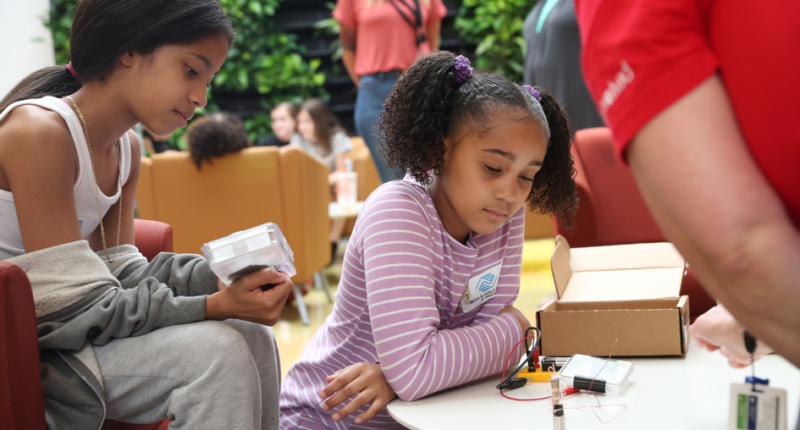Boys & Girls Clubs of America offers a DIY STEM program that provides hands-on, activity-based learning opportunities for youth to connect STEM theories and applications to real-world situations. These opportunities allow students to strengthen their retention of STEM concepts and enable them to aspire to a STEM-based career. STEM learning experiences, role models, and female scientific figures like Katherine Johnson help inspire female STEM professionals at Boys & Girls Clubs to pursue their dreams in STEM. With the demand for STEM talent growing at a remarkable pace, Thermo Fisher Scientific and Boys & Girls Clubs of America are changing the game by nurturing a 21st-century STEM workforce that accurately reflects society and leverages diversity to solve the world’s most complex problems. According to Dr. Varma, the most important thing is to remember that you have the power to change the gender gap in STEM.
The Rise of Women in STEM
With the help of the DIY STEM program and Club virtual learning platforms, the next generation of female inventors and innovators is taking shape at Boys & Girls Clubs. By working with everyday items, club kids are learning to design, construct and launch rockets made from ordinary drinking straws, create light bulbs from mason jars, pie pans and toilet paper tubes, and even concoct soda pop from baking soda, citric acid and wooden coffee stirrers.
Dr. Kamini Varma, Vice President of Research & Development Genetic Testing Solutions at Thermo Fisher, highlights the importance of increasing diversity in the STEM workforce. Women currently make up less than 30% of STEM workers despite comprising 48.5% of the international workforce. Thermo Fisher, a national partner of Boys & Girls Clubs of America, is committed to addressing this disparity by providing access to STEM education and inspiring the next generation of innovators. They have renewed their partnership to support the usage of DIY STEM Kits at Clubs across the nation and DIY STEM on Boys & Girls Clubs’ virtual learning platform.
According to Dr. Varma, encouraging STEM education for girls is essential to building a future workforce that better represents society and can solve the world’s most complex problems. Her team at Thermo Fisher is responsible for developing molecular diagnostic products that enable customers around the world to detect a variety of diseases, including COVID-19. In fact, her team designed and validated one of the first COVID-19 tests to receive Emergency Use Authorization by the U.S. Food and Drug Administration.
Boys & Girls Clubs of America has a significant role to play in shaping the future of women in STEM. An impressive 77% of Club girls express curiosity about science, computers or technology, indicating that many are already keen to learn more and pursue STEM careers. By providing equitable access to STEM education, Clubs are positioning female Club members to become the next wave of outstanding inventors, creators, and scientists.
In conclusion, with the support of programs like DIY STEM and Club virtual learning platforms, the future of STEM is female.
Breaking Gender Stereotypes in STEM: The Power of Experiential Learning
Dr. Kamini Varma, Vice President of Research & Development Genetic Testing Solutions at Thermo Fisher, highlights the challenges girls and women face in STEM due to gender stereotypes that often begin at a young age. Boys are often thought to be better at math, and girls may feel discouraged from pursuing STEM fields. However, programs like DIY STEM at Boys & Girls Clubs are changing this perception by offering hands-on, activity-based learning opportunities for youth to connect STEM theories and applications to real-world situations.
At Waltham Boys & Girls Club, seventh-grader Alexandra B. developed a newfound excitement for STEM discovery. Previously, she believed that math and science weren’t for girls, but through the DIY STEM program, she learned that girls can do anything they want to do. Alexandra’s experience demonstrates the power of experiential learning in promoting a growth mindset and breaking down gender stereotypes.
The DIY STEM program offers a variety of activities that allow students to strengthen their retention of STEM concepts while building 21st-century skills like productivity, adaptability, and communication. From studying bacteria in their environment to interacting with a virus outbreak simulator, students have the opportunity to explore their creativity and bring their own unique signature to projects.
According to Dr. Varma, a hands-on approach to STEM education can help students discover the wide presence and applicability of STEM while building their confidence. This virtuous cycle creates a path for students to aspire to a STEM-based career.
It’s encouraging to see that 60% of Club girls say they’re good at solving science-related problems. By providing equitable access to STEM education and inspiring the next generation of innovators, Boys & Girls Clubs of America is positioning female Club members to become the next wave of outstanding inventors, creators, and scientists. The future of STEM is female, and with the support of programs like DIY STEM and Club virtual learning platforms, the next generation of women problem-solvers in STEM is taking shape now.
Building Confidence in Aspiring Female STEM Professionals
Dr. Kamini Varma, Vice President of Research & Development Genetic Testing Solutions at Thermo Fisher, was fortunate to attend all-girls schools in India that provided her with female role models and built her confidence. Dr. Varma’s aunt, who worked at a nonprofit that supported improved agricultural outcomes for populations experiencing food insecurity, also inspired her to pursue a career in science. Similarly, sixth-grade Club kid Nicolly S. found a role model in her mentor, Ms. Sophia, who helped her understand STEM problems and motivated her to work harder.
At Boys & Girls Clubs, aspiring female STEM professionals have the opportunity to gain exposure to hands-on STEM education and build their confidence. The DIY STEM program and Club virtual learning platforms offer activity-based learning opportunities that allow students to explore their creativity and bring their own unique signature to projects. By providing equitable access to STEM education and inspiring the next generation of innovators, Boys & Girls Clubs of America is positioning female Club members to become the next wave of outstanding inventors, creators, and scientists.
According to Dr. Varma, representation of women in STEM at different levels is crucial to breaking down gender barriers and promoting a sense of belonging. Many breakthroughs have come from seeking out both male and female mentors along the way. Aspiring female STEM professionals at Boys & Girls Clubs are motivated by their mentors and female STEM heroes to nurture their power to gain and apply their skills with confidence.
It’s encouraging to see that 43% of Club girls say they would like to have a STEM-related job in the future. By providing a fun and engaging learning environment that allows students to have an open mind and focus on learning or making something new, Boys & Girls Clubs are breaking down gender stereotypes and empowering the next generation of female STEM professionals.
In conclusion, the DIY STEM program and Club virtual learning platforms provide invaluable experiential learning opportunities that promote a growth mindset and build 21st-century skills like productivity, adaptability, and communication. By nurturing aspiring female STEM professionals and promoting representation at all levels, Boys & Girls Clubs of America is positioning female Club members to become the next wave of outstanding inventors, creators, and scientists. The future of STEM is female, and the Club girls of today are poised to become the STEM leaders of tomorrow.
The Importance of Female Role Models in STEM
At Boys & Girls Clubs, young girls are encouraged to explore their interests in science, technology, engineering, and math (STEM) through hands-on activities, virtual learning platforms, and mentorship programs. With the help of the DIY STEM program, students can develop their problem-solving skills and foster a growth mindset through activity-based learning opportunities. The program has been so successful that 77% of Club girls say they’re curious to learn more about science, computers, or technology, and 60% say they’re good at solving science-related problems.
The Power of Female Role Models
Dr. Kamini Varma, Vice President of Research & Development Genetic Testing Solutions at Thermo Fisher, acknowledges that gender stereotypes can discourage girls and women from pursuing STEM careers. However, Dr. Varma credits her own success in STEM to the absence of gender stereotypes in her early education and the female role models she encountered. Similarly, Club kid Alexandra B. was inspired by Katherine Johnson, an award-winning American mathematician, and one of the mathematicians who helped NASA send the first astronauts into space. Johnson’s story taught Alexandra that she could overcome stereotypes, racism, and sexism to achieve her dreams.
Encouraging Diversity in STEM
Despite comprising nearly half of the international workforce, women account for less than 30% of STEM workers. Thermo Fisher, a national partner of Boys & Girls Clubs of America, recognizes the importance of fostering equitable access to STEM education and inspiring the next generation of innovators. As such, the company supports the usage of DIY STEM Kits at Clubs across the country and DIY STEM on Boys & Girls Clubs’ virtual learning platform. Thermo Fisher’s Women’s Empowerment Business Resource Group also mentors women in STEM careers, encouraging them to dream and be successful.
The Future of STEM is Female
Nicolly S., a sixth-grade Club kid, says that her mentor, Ms. Sophia, helps her understand problems and motivates her to work harder. Nicolly appreciates that STEM learning at the Club is different from school, as the learning environment is fun and allows her to have an open mind. Nicolly hopes to follow in Ms. Sophia’s footsteps and work in a STEM-related field that helps people.
Boys & Girls Clubs of America is committed to providing hands-on STEM experiences that inspire girls to pursue STEM careers. Through their efforts, 43% of Club girls say they would like to have a STEM-related job in the future. As the demand for STEM talent continues to grow, it’s essential to provide access to high-quality STEM education that accurately reflects our society and leverages its diversity to solve the world’s most complex problems.
Don’t miss interesting posts on Famousbio









